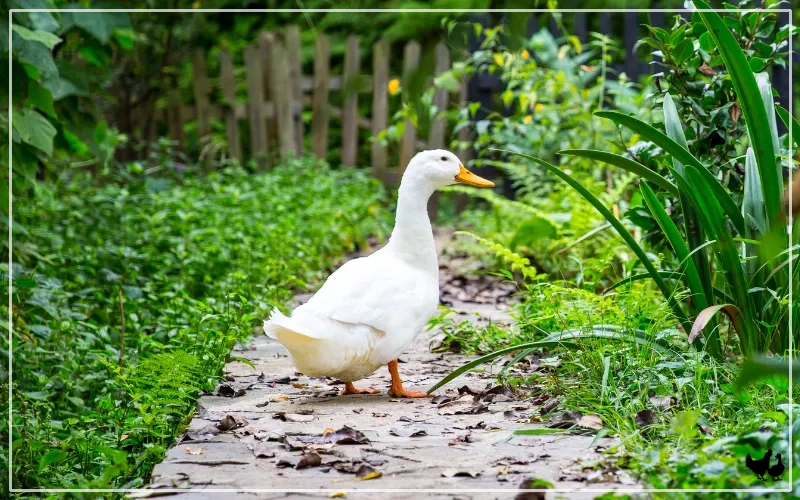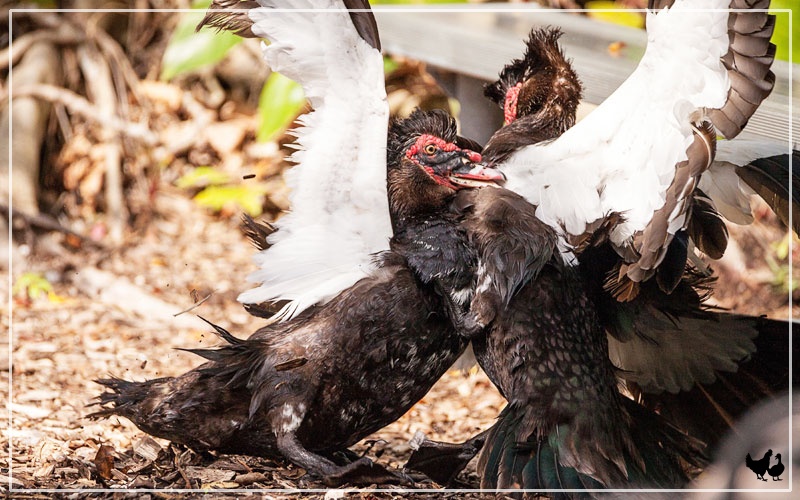Pekin Duck vs Muscovy Duck – What is the Difference?
Pekin ducks and Muscovy ducks are some of the best duck species for quality duck meat and eggs. These two duck species look pretty much alike. Despite their similar resemblance, the two species have some differences in appearance, size and weight, temperament, and egg and meat production.

Appearance
Adult Pekin ducks have a creamy white plumage. They also have yellow bills with orange toes and shanks. Males have longer bodies and necks than females. Pekin ducks have creamy and white feathers. Their legs can be either orange-yellow or reddish.
These ducks have shorter wings and vertical posture. The eyes of Pekin ducks have a grayish-colored iris if you observe these ducks from a close range. Their eyes have a blackish color if you watch them from afar.
Muscovy ducks are giant, heavy-bodied ducks. Their plumage can vary considerably depending on their habitat. Most Muscovy ducks, however, have a dark plumage. Adult Muscovy ducks have white patches on their wings, while juveniles have smaller white patches on their wings.
Due to their long necks, Muscovy ducks look pretty much like small geese. Their bill is reasonably long, with a smooth slope that extends to the forehead. They have reddish facial skin.
Size and Weight
Pekin ducks have large and solid bodies. Their bodies have a rectangular shape if you look at these ducks from the side. Male Pekin ducks are heavier than hens. Drakes weigh between 10 and 12 pounds on average. Hens weigh between 8 and 11 pounds. Pekin drakes measure around 20 inches from their crowns to their tail tips, while females measure 15 inches.
Muscovy ducks are also large duck species, which resemble small geese due to their long necks. They are heavier than Pekin ducks, with drakes weighing between 10 and 15 pounds on average.
Hens are, however, lighter than drakes, and most of them weigh between 9 and 12 pounds—Drakes measure around 35 inches from their tail tips to their crowns. Hens measure approximately 25 inches on average.
Temperament
Temperament is another significant difference between Pekin and Muscovy ducks. Muscovy ducks are slow-moving, docile, and calm if they aren’t under any threat. However, Muscovy ducks hate provocations.
Your Muscovy ducks will fearlessly defend themselves from predators and intruders. Drakes are aggressive and bad-tempered. They are also essentially territorial and thus not a suitable choice of pets to have in your home.
Pekin ducks are also docile and a bit friendly. These ducks develop a strong bond between them and their owners and other ducks in the flock. Drakes, however, can be aggressive sometimes, although they tend to be friendlier than hens. Overly, Pekin ducks can be suitable pets for bird lovers.
Egg Production
Egg production is an essential consideration for people who want to keep ducks for eggs. You probably like to know which of these two duck species have a high egg production if you decide whether to keep Pekin or Muscovy ducks for egg production.
On average, Pekin ducks have a high egg production compared to their Muscovy counterparts. A Pekin hen can lay between 200 and 300 hundred eggs a year. A Muscovy hen will lay between 60 and 120 eggs annually.
Nonetheless, Muscovy hens’ eggs are larger than Pekin hens’ eggs. Furthermore, the eggs from Muscovy ducks are more nutritious since they have plenty of yolks. If you want a duck species which can lay many eggs, then Pekin ducks are the best choice for you. Nonetheless, consider keeping Muscovy ducks if you are looking for a duck species that will provide larger and more nutritious eggs.
Muscovy hens also hatch their eggs much quicker than their Pekin counterparts. Muscovy hens hatch their eggs around 28 days, while Pekin hens need at least 35 days to hatch their eggs.
Meat Production
Both Muscovy and Pekin ducks are meat breeds with high-quality meat. Pekin ducks, however, have a higher meat production than Muscovy ducks. Pekin ducks also grow much faster compared to Muscovy ducks. Also, Pekin ducklings can weigh around 2 pounds with seven weeks if you provide the ducklings with plenty of high-quality food and water.
Muscovy ducklings can take over ten weeks to get at least 2 pounds heavy. Pekin ducks are ready for butchering when they are about ten months. On the contrary, Muscovy ducks aren’t ready for butchering until they are around 20 weeks.
Pekin ducks have much tastier and softer meat than Muscovy ducks’ meat. Nonetheless, Pekin ducks’ meat is quite greasy, although it tastes much better than Muscovy ducks’ meat, which has a strong flavor. The flavor from Muscovy ducks’ meat tastes gamier than ducky.
Housing and Care
Pekin and Muscovy ducks are some of the popular domestic duck species among duck keepers today. These two species have different housing and care needs. Due to their large size, Muscovy ducks need plenty of housing and care compared to Pekin ducks, especially if you are keeping your Muscovy ducks indoors.
Although Pekin ducks are relatively smaller than Muscovy ducks, they still require proper housing and care like any other duck species.
– Pekin Ducks Care
Whether you are keeping Pekin ducks for meat, eggs, or as pets, you have to ensure you provide your Pekin ducks with safe housing. Provide spacious housing for your ducks, mainly if you have several Pekin ducks in the flock. Ensure the cage is free from cold and rain, mainly if there are ducklings inside the cage.
Harsh weather elements including snow and rain can subject your Pekin ducks to health problems. Even outdoor ducks still require a place where they can shelter on winter and rainy days. Having a temporary shelter outdoors where your free-ranging Pekin ducks can shelter during harsh weather will protect your ducks’ health in the long run.
Ensure every duck has a minimum of 1.5 sq. meter living space while keeping Pekin duck indoors. There should be no gaping holes in the cage to stop predators from getting anywhere near your Pekin ducks.
Other than providing suitable housing, ensure your Pekin ducks live in a clean environment. Pekin ducks are also messy like other duck species. Therefore, you will need to clean their cage regularly to stop the accumulation of dirt inside the cage, which can easily make your Pekin ducks smell bad. Clean the cage at least weekly.
Diet is also paramount for people keeping Pekin ducks either for eggs or meat. Even for free-ranging Pekin ducks, which can easily find food outdoors, supplementing their diet is crucial for enhancing the growth and health of your Pekin ducks.
Pekin hens, for instance, need lots of protein to sustain their egg-laying capabilities. Free-ranging ducks can pick on a variety of insects when they are outside. But indoor Pekin ducks are at risk of having protein deficiency since they will entirely depend on the protein sources you provide the ducks.
It helps to give your Pekin ducks plenty of protein supplements, regardless of whether they are living indoors or outdoors. Corn is suitable for free-ranging Pekin ducks since free-ranging ducks need the energy to roam outside.
Furthermore, corn is beneficial for duck keepers who keep Pekin ducks for meat since corn makes your ducks heavier over time. Too much corn will, unfortunately, make your Pekin ducks overweight with time. Overweight Pekin ducks are at a high risk of death.
Pekin ducks also need vitamins like other ducks. Vitamins from vegetables, including kales and lettuce, will be essential in reinforcing your Pekin ducks’ health systems. Pekin ducks are also vulnerable to diseases, including flu and avian cholera. Ducks need a more robust immune system to overcome such disorders.
Pekin ducks also need water to survive. Water will help your Pekin ducks overcome dehydration, especially in summer. Pekin ducks need water to bathe to cool their body temperature. Therefore, provide clean water to your Pekin ducks which they can drink and swim to cool themselves down.
– Muscovy Ducks Care
Muscovy ducks are large, and they require proper housing, mainly if there are multiple Muscovy ducks living indoors. The cage where you house your Muscovy ducks should be broad and tall enough to accommodate your ducks. It shouldn’t have holes to stop predators from attacking your Muscovy ducks or stealing their eggs.
Like Pekin ducks, Muscovy ducks also need a proper diet. Protein is essential for your Muscovy ducks if you are keeping these ducks for meat production. Protein will increase their muscle, helping the ducks have more meat when they are ready for butchering.
Calcium will help your Muscovy ducks grow faster, making them ready for butchering in a couple of weeks. Furthermore, calcium is ideal for enhancing bone development in your Muscovy ducklings, hindering them from developing rickets as they grow.
Muscovy ducks need plenty of water, unlike other duck species, since they consume plenty of food due to their huge size. Muscovy ducks need to take lots of water to keep their digestive systems running smoothly. They also need water for taking occasional baths to keep them cool during hot days.
Conclusion
Both Pekin and Muscovy ducks are excellent duck species for anyone looking for a suitable duck species for meat or eggs. The care you give to your Pekin and Muscovy ducks will keep your ducks healthy and also improve their meat and egg production in the long run.



